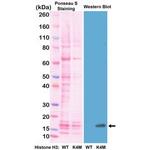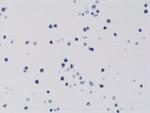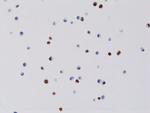Search Thermo Fisher Scientific
Invitrogen
H3.3 K4M oncohistone mutant Recombinant Rabbit Monoclonal Antibody (RM363), Biotin
FIGURE: 1 / 3
H3.3 K4M oncohistone mutant Antibody (MA5-44567) in WB



Product Details
MA5-44567
Species Reactivity
Host/Isotype
Expression System
Class
Type
Clone
Immunogen
Conjugate
Form
Concentration
Purification
Storage buffer
Contains
Storage conditions
Shipping conditions
RRID
Product Specific Information
This antibody reacts to mouse MerTK (Tyrosine-protein kinase Mer).
Target Information
Histone H3 is one of the DNA-binding proteins found in the chromatin of all eukaryotic cells. H3 along with four core histone proteins binds to DNA forming the structure of the nucleosome. Histones play a central role in transcription regulation, DNA repair, DNA replication and chromosomal stability. Post translationally, histones are modified in a variety of ways to either directly change the chromatin structure or allow for the binding of specific transcription factors. The N-terminal tail of histone H3 protrudes from the globular nucleosome core and can undergo several different types of post-translational modification that influence cellular processes. These modifications include the covalent attachment of methyl or acetyl groups to lysine and arginine amino acids and the phosphorylation of serine or threonine.
For Research Use Only. Not for use in diagnostic procedures. Not for resale without express authorization.
References (0)
Bioinformatics
Protein Aliases: H3 histone, family 3B (H3.3B); H3 K4; H3 K4M; H3/b; H3/d; H3/f; H3/j; H3K4 mutant; H3K4M; Histone 3; Histone H3 K4M; Histone H3.3; Histone H3K4M
Gene Aliases: H3-3A; H3-3B; H3.3A; H3.3B; H3F3; H3F3A; H3F3B; PP781
UniProt ID: (Human) P84243
Entrez Gene ID: (Human) 3020, (Human) 3021

Performance Guarantee
If an Invitrogen™ antibody doesn't perform as described on our website or datasheet,we'll replace the product at no cost to you, or provide you with a credit for a future purchase.*
Learn more
We're here to help
Get expert recommendations for common problems or connect directly with an on staff expert for technical assistance related to applications, equipment and general product use.
Contact tech support
